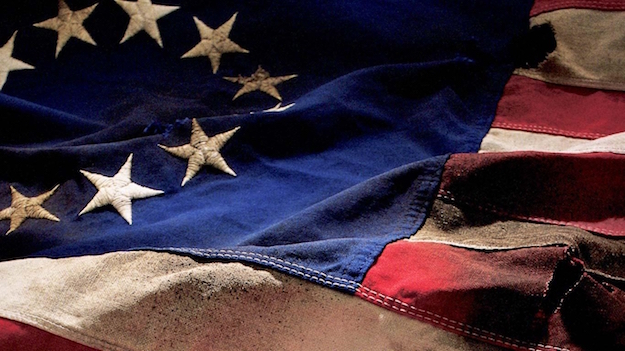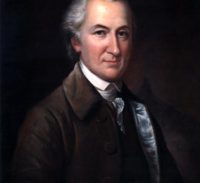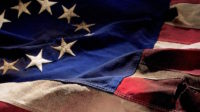Dickinson recognized that the essential purpose of government was to maintain liberty against others’ predatory acts.
 John Dickinson was among America’s most important founders. He was a colonial legislator, member of the Stamp Act, Continental, and Confederation Congresses, chief executive of both Delaware (by a 25 to 1 vote; his being the only opposed) and Pennsylvania, president of the 1786 Annapolis convention that led to the Constitutional Convention, and among the most informed and seasoned statesmen to attend it. Historian Forrest McDonald wrote that, but for Dickinson and a few others, “the resulting constitution would not have been ratified.”
John Dickinson was among America’s most important founders. He was a colonial legislator, member of the Stamp Act, Continental, and Confederation Congresses, chief executive of both Delaware (by a 25 to 1 vote; his being the only opposed) and Pennsylvania, president of the 1786 Annapolis convention that led to the Constitutional Convention, and among the most informed and seasoned statesmen to attend it. Historian Forrest McDonald wrote that, but for Dickinson and a few others, “the resulting constitution would not have been ratified.”
Penman of the Revolution
Despite his other roles, Dickinson was best known as the “Penman of the Revolution.” Perhaps his most important writings were his Letters from a Farmer in Pennsylvania to the Inhabitants of the British Colonies. After publication as letters, beginning December 21, 1767, in the Boston Chronicle, they were republished as a pamphlet, reprinted in most colonial newspapers and read widely, making him America’s first homegrown hero. As we pass their 250th anniversary, we would again profit by recalling John Dickinson’s words promoting our liberty.
We cannot be happy, without being free…we cannot be free, without being secure in our property…we cannot be secure in our property, if, without our consent, others may, as by right, take it away.
[Mankind’s] welfare…can be found in liberty only, and therefore her sacred cause ought to be espoused by every man on every occasion, to the utmost of his power.
Violations of the rights of the governed, are commonly…small at the beginning… They regularly increase…till at length the inattentive people are compelled to perceive the heaviness of their burdens…too late. They find their oppressors so strengthened by success, and themselves so entangled in examples of express authority on the part of their rulers, and of tacit recognition on their own part, that they are quite confounded.
A free people therefore can never be too quick in observing, nor too firm in opposing the beginnings of alteration…respecting institutions formed for their security…the forms of liberty may be retained, when the substance is gone.
Divine Providence…gave me existence in a land of freedom…I shall so highly and gratefully value the blessing received as to take care that my silence and inactivity shall not give my implied assent to any act, degrading my brethren and myself from the birthright, wherewith heaven itself “hath made us free.”
Liberty, perhaps, is never exposed to so much danger, as when the people believe there is the least; for it may be subverted, and yet they not think so.
The love of liberty is so natural…that unfeeling tyrants think themselves obliged to accommodate their schemes as much as they can to the appearance of justice and reason…to deceive those whom they resolve to destroy, or oppress.
For who are a free people? Not those, over whom government is reasonable and equitably exercised, but those who live under a government so constitutionally checked and controlled, that proper provision is made against its being otherwise exercised.
I am resolved to contend for the liberty delivered down to me.
Motivation

John Dickinson
When John Dickinson died, both houses of Congress wore black armbands in mourning. Why? Because Dickinson recognized that the essential purpose of government was to maintain liberty against others’ predatory acts and that without liberty, “loss of happiness then follows as a matter of course,” helping motivate our founders to create a government whose basis in liberty would make them “protectors of unborn ages, whose fate depends upon your virtue.”
For the 250th anniversary of John Dickinson’s most famous work on behalf of liberty, we can again benefit from his words. He motivated our forefathers to prevent the possibility that “the tragedy of American liberty is finished.” We need to become as motivated as they were.
As Dickinson and Jefferson wrote in Declaration of the Causes and Necessity of Taking Up Arms, “Honor, justice, and humanity, forbid us tamely to surrender that freedom which we received from our gallant ancestors, and which our innocent posterity have a right to receive from us,” requiring that we “regard…oppressive measures as freemen ought.”
Written by Gary M. Galles and published by the Foundation for Economic Education ~ December 12, 2017
 FAIR USE NOTICE: This site contains copyrighted material the use of which has not always been specifically authorized by the copyright owner. We are making such material available in our efforts to advance understanding of environmental, political, human rights, economic, democracy, scientific, and social justice issues, etc. We believe this constitutes a ‘fair use’ of any such copyrighted material as provided for in section 107 of the US Copyright Law. In accordance with Title 17 U. S. C. Section 107, the material on this site is distributed without profit to those who have expressed a prior interest in receiving the included information for research and educational purposes. For more information go to: http://www.law.cornell.edu/uscode/17/107.shtml
FAIR USE NOTICE: This site contains copyrighted material the use of which has not always been specifically authorized by the copyright owner. We are making such material available in our efforts to advance understanding of environmental, political, human rights, economic, democracy, scientific, and social justice issues, etc. We believe this constitutes a ‘fair use’ of any such copyrighted material as provided for in section 107 of the US Copyright Law. In accordance with Title 17 U. S. C. Section 107, the material on this site is distributed without profit to those who have expressed a prior interest in receiving the included information for research and educational purposes. For more information go to: http://www.law.cornell.edu/uscode/17/107.shtml
